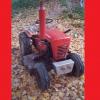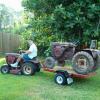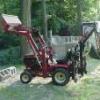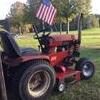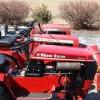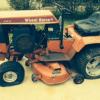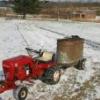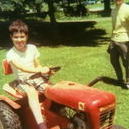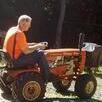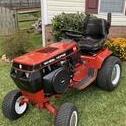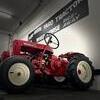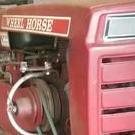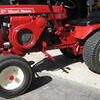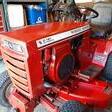|
|
Leaderboard
-
in Posts
- All areas
- Markers
- Marker Comments
- Marker Reviews
- Articles
- Article Comments
- Article Reviews
- Classfieds
- Classified Comments
- Classified Reviews
- Wiki's
- Wiki Comments
- Wiki Reviews
- Blog Entries
- Blog Comments
- Images
- Image Comments
- Image Reviews
- Albums
- Album Comments
- Album Reviews
- Files
- File Comments
- File Reviews
- Posts
-
Custom Date
-
All time
November 28 2011 - December 23 2025
-
Year
December 23 2024 - December 23 2025
-
Month
November 23 2025 - December 23 2025
-
Week
December 16 2025 - December 23 2025
-
Today
December 23 2025
-
Custom Date
05/10/2024 - 05/10/2024
-
All time
Popular Content
Showing content with the highest reputation on 05/10/2024 in Posts
-
10 pointsToday’s letter is “H” Huber built a history of hometown heritage. Huber Tractors: A Proud Tradition Edwin Huber was a blacksmith who developed a revolving hay rake. In 1863, at the age of 26, Huber was granted a patent for this machine. It was the first of the more than one hundred he would receive during his lifetime. Huber Manufacturing Company began in 1874 building threshers and other farm machinery. They started production of portable steam engines in 1877 followed by a steam traction engine in 1878. An important innovation was the Huber patented double pass boiler producing 40% greater efficiency than a straight flue engine. Huber entered the heavy construction- equipment market by pioneering the use of weighted rollers on his steam engines to compact the road surface. In 1892 John Froelich had produced the first successful gas tractor using a Van Duzen vertical cylinder engine. Edward Huber was so impressed with the Van Duzen engine that he bought the company. In 1898, Huber Mfg. Co. produced its first gas tractor. These tractors used a modified Huber steam traction engine frame, transmission and steering mechanism powered by a Van Duzen gas engine. Huber became the earliest manufacturers to mass produce a gas farm tractor having built thirty units. Steam was still king at the time and the gasoline engine tractor needed further development. When Huber returned to gas tractor market in 1911 significant improvements had been made in both ignition and carburetion systems. The “Farmer’s Tractor” had a 2-cylinder engine with 311 CID. It was sold as more or less a portable power unit for belt work. A great deal of testing took place to make the Huber a true tractor. In 1915 Huber brought out a 20-40 2-cylinder tractor with a massive 962 cubic inch displacement engine. The next generation of Huber tractors, the Light Four 12-25, appeared in 1916. This tractor used a four-cylinder Waukesha engine with a 289 CID mounted crosswise on the frame. With the engine being mounted across the frame gearing was simplified. In 1919, Huber upgraded the Light Four using a Waukesha engine with a 365 CID. These high-front wheel models were Huber’s first truly successful tractors with production continuing until 1928. 1929 brought the next generation of the Huber tractor. It utilized the “Wallis U-Frame” method of construction which reduced the tractor’s weight by around 2,000 pounds. Huber used its arched front axle 10-20 Modern Farmer tractor in 1930 then adopted the tricycle design for the Modern Farmer cultivating tractor. Three hundred of these tractors were sold to Farm Bureau as CO-OP tractors in 1935. Modern Farmer L and LC tractors were built up to the end of production in 1942. The final evolution of Huber farm tractors made its debut in 1936 as the Model B. This 2- to 3-plow tractor was Huber’s only styled tractor and was marketed until 1942. Huber farm tractors were produced from 1898 until 1942 when the War Powers Act of 1941 decreed that Huber concentrate on road construction equipment in support of the war effort. After the war, Huber did not return to the farm equipment business. However, the Model B became the platform for the Huber Maintainer, an adaptable road montane tractor. With the many attachments fitted to the machine, the Maintainer became a motor grader, a loader, bucket, bulldozer, side dozer, scarifier, berm leveler, road sweeper (broom) and a sickle bar roadside mower. Production of the Huber Maintainer ended when the parent company, ATO, closed the doors to the manufacturing facility in 1984. Edward Huber was a civic leader guiding the city into the industrial revolution. He was instrumental in the building of the Marion Electric Company, the Marion Street Railway, the Marion Oil Company, the Marion Tool Works, and the Prendergast Lumber Company. He founded the Marion Building and Loan Company and the Marion Malleable Iron Company.
-
7 points
-
7 pointsGot a section of blade from Don (Lee1977) and built a grader with it. Has five positions and weighs close to 100lbs. Handle allows for repositioning from the seat. Side plates are removable.
-
6 pointsSaw this on the news app earlier and I thought some of you might find it interesting. Most of the USA should be able to see it with their naked eye or with a camera. They said “The storm will be strengthening from 10 p.m. Friday to 1 a.m. Saturday, but the best time to see them will likely be from 1 a.m. to 4 a.m. Saturday. The lights would likely fade again between 4 and 7 a.m. Saturday.” This is in central time.
-
6 pointsIf I can stay awake. May have to set the alarm. Of course the bathroom usually calls me sometime during those hours.
-
5 pointsPicked up a pretty rough Commando 800 from Paul @PWL216 at the Zag show. Been tinkering after work on it all week. The original plan was to just repower with another 8hp Kohler but one thing about those little 8s, they all want to run. So, spent some time on points clean, solenoid, oil change and a new carb to just to see what's up and got her fired up. Starts quickly, runs smooth and no smoke. A bonus! The hood was damaged a bit so got that straightened out so it fits, some tires with air in them and it's running driving and much better than expected. Some of the guys that saw it might not recognize it now. There's still a bunch of stuff to do but it should be a great little snow plow machine for someone looking for a worker. Citrus paint remover works well for getting rid of that rattle can hack spray. All the decals were covered. The blade that was planned for another little 2 seater rear fender will be sacrificed for this one and I'll find another. Running and driving now and the steering is really tight. Actually drives pretty nice with smooth shifting and excellent brakes. That's just a temp battery on the front of the blade frame for now. Basically a B-80 now
-
4 pointsI had a difficult time sealing tire beads when changing tires. I searched YouTube for a solution and someone said that if you take a 20 inch bicycle tube and inflate it enough to take up the gap then you can seal it easily. I tried it and it does work Once it's mostly sealed then remove the tube and continue inflating. Sometimes it takes a couple tries but eventually it will seal. Let most of the air out once it pops to be able to remove the tube. I used a centering cone from amazon to center the wheel on the tire machine and also to help protect it from scratches. Also got this tire machine adapter in the following YouTube link to change tires easily and it works https://www.amazon.com/dp/B0CBR5Y21D?ref=ppx_yo2ov_dt_b_product_details&th=1
-
4 pointsThe voltage regulator has nothing to do with engine spark. At least until the battery goes too low to power the coil. First thing I would try is to is clean the points. Turn the engine over till your points are in a closed position. Pry them open and work a piece of 400 grit or finer paper through them a few times. Then do the same procedure using a dollar bill instead of the sand paper a couple of times. If you have a multi-meter - Disconnect the coil "-" wire that goes from the points to the coil, set your meter to check ohms, with the points closed you should have continuity from the "-" wire to engine ground. If you do not, clean the points again until you do.
-
4 pointsWhen i bought me the Subaru i found few minor issues, i knew when i buy it. the last few day‘s i was able to solve them except... yeah except the Cruise control functionality. ok not too bad for me but i want that all the gimmicks work as they should. so today i investigated what‘s the issue. firstly i again check all hoses and pipes - they be fine. Than i checked the wires for scratches or shorts - here i found an issue on the Clutch Switch. It want work. A quick lurking on the pedal seems all is fine. When i pressed the clutch switch by fingers it does work with the pedal it won‘t. a closer investigation ( it‘s a dang small area there) shows me a hole in the pedal where the switch shall be pressed. it seems they have a small rubber dot, what gives the switch it‘s trigger. i checked all my ressources and found a rubberpin from the old Astra, what was originally a distance spacer. it fits in the hole and now the trigger acts like it should. The final testdrive give me the sucess to that story. now all is working as it should. small cause but big effect.
-
4 points
-
4 pointsBeing that this is a Wisconsin engine mated with a Kohler generator, the likely hood of the crank & gen shafts being one piece is low. I would venture to say that it will have a tapered end on the crank shaft. Don't know for sure without taking it apart. Also not a big issue thanks to adaptors from taper to keyed shafts. A far as converting it to gasoline - It looks like they simply plumbed the LP into the intake and used the original carburetor to meter the air. Simple task when you only plan to run the engine at one speed, as you would do with a generator. The original carb might still work if you plumbed gas to it. The timing may have to change but they might have just left it as it was. We used to convert Vanguard engines to LP, all we did was add a plate under the carb to give a place to plumb the LP in. Did not change anything else on the engine. Kohler LP engines came with different heads & flywheels. The different fly wheel was to change the timing. The heads had harden valve seats & higher compression, but still used a basic plate under the carb to get LP in. Design variables on the Wisconsin are unknown to me, sorry.
-
4 pointsOk, I have to Fess-Up. The grandkids love "Nanny's" Blackberry Custard Pie. She makes 5-6 pie crust ahead of time and freezes them. So when I brought the big bowl of berries in, she said she was going to make the Grandkids a pie since we wont be home to have them over this Sunday. So, I mentions that she already had extra crust made, how about making one for US. Here's a lesson for you guys that will be grandpa's soon, It may be stooping low, but Riding on the Nanny-Grandkids coat tails is a fairly successful way to accomplish many things! pies, extra tractors, extra tool sets, etc.
-
4 points
-
3 pointsI've noticed when using shop vac to vacuum water that the filter gets wet. I ruined one vacuum because the water was pulled into the motor. Today I had to pull our toilet so I used the shop vac to draw the water out of bowel and tank. I made a diffuser to direct the water downwards. The filter only had a few drops of water on it.
-
3 pointsWell, I finally got around to it, but I eliminated the condenser on my C165 and replaced it with a Gammatronix unit. The points are still there, but serve as a switch to fire the system. With a few minutes of run time, I have noticed a slight improvement in higher RPMs. I know this isn't the best place to mount this, however, it isn't permanent, just for testing. The bigger questions is: Can I use an electronic ignition emblem emblem from a junkyard? What's next, fuel injection?
-
3 pointsFeel free to spend your money any way you choose to, $ 37.50 US Dollars plus shipping can buy a lot of condensers.
-
3 pointsMold board plow 10" No idea what brand... Been on the shelf for several years I have clay and rocks and no need for the plow. $50
-
3 pointsHonestly I would stick with the original if it works... Yes bending things is the new cheap way to adjust. I have had bad luck with regulators lately. Fail after only a few hours...
-
3 pointsYes sir, connects with standard axle hitch. Only drawback would be the weight if used with manual lift. Definitely would need "Dial-a-height" for manual lift to set the cut depth.
-
3 pointsThat's some strange looking snow! And it's warm enough to go without socks and it doesn't melt!
-
3 pointsTo say it with Rally Champion Striezel Struck‘s words, a car have just than enough power when you feared to fire it up. 😎
-
3 pointsMany times whoever, the crank is a tapered end shaft and a snug (press like) fit. I tagged Dan, and he’ll get here eventually. He works at a big genny manufacturer blowing up new ideas in the R&D lab. He’ll know.
-
3 points@Achto… Propane runs a higher compression. The heads have smaller chambers generally. You can run LP heads in gasoline applications, but you may find you need higher octane fuel. Timing may be set differently, but it is able to be changed. In high school, I had an S10 Blazer mud truck with a 366 tall deck big block Chevy that ran on propane. I read that I could get 15% more power by converting it to gas. I had it blown up within a day or two of my “conversion” by tosssing a 4 bbl carb on and running it.
-
3 pointsFood for thought. Not to discourage, but to encourage plenty of research. If you're considering removing the generator from the engine you should be aware that ~some~ generator sets use the engine crankshaft as the mainshaft. One continuous piece. Others have a two piece main shaft but will NEED to be balanced by a professional engine shop or it will destroy the engine. Because it's a Kohler generator powered by a Wisconsin engine one would think it was separable. Personally, I find it interesting and odd that a manufacturer who made their own engines would use that of the competition. If there's a way to get a Spec number from the ENGINE then maybe you could determine if the original build was for gasoline, propane, or flex. That was common even then.
-
3 pointsI thought that was somebody on a Wheel Horse ahead of you going out the other side of the bridge…
-
3 points
-
2 pointsThese are 17 inch truck tires and they're not mine, mounting them for a friend. I put tubes in all my tires
-
2 pointsI have a 1979 c-101 that I bought new in 1979, it has the original points and condenser, I have never touched either one. Runs great and has many many hours on it no hour meter. Could be a fluke or dumb luck. Bob
-
2 pointsAlready got several 2" straps and I tried that but it doesn't always work. If I make it too tight it pushes the tread in before it widens the bead separation
-
2 pointsBetter yet, I’ll trade you a 2” ratchet strap to squeeze the tire in, for dibs on that pull start 10 horse Kohler that Richie has
-
2 points
-
2 points
-
2 points
-
2 pointsClean points contacts, condenser on the - side of the coil You can rotate the engine by hand until the points are in the fully closed position (If they aren't already), then turn the key to RUN, not to start. Now you can manually flip the points open and closed to simulate the engine rotation and easily watch for spark.
-
2 points
-
2 pointsThank you everyone for the input on this subject as I now have a lot to consider because these setups appear more frequently for sale than just the wisconsin engines alone. As far as keeping it LP as tractorhead suggested, I wouldn't want to keep it that way as my hairbrained idea wouldn't allow. I was thinking repowering a WH into a monster or something more exotic 🤭
-
2 points
-
2 pointsPulled the left rear to try and repair a slow leak. I was a bit surprised to find the logo on the filter. Even more surprised to find it on the three new OEM filters I purchased. Not as cool as @Bill D 's red but still cool.
-
2 pointsYup - bending the upper spring tab is the "adjustment". A little goes a long way. Way too easy to overdo it....
-
2 points
-
2 pointsMany of these articles mention the transition from steam to gas power around the turn of the century. I wonder, if at the time, how much resistance to the internal combustion engine was going on? Like today's resistance to electric. Do you figure in 80 years some tractor person will be writing about the evolution of the electric tractors during our times? This might just be one ad.
-
2 pointsI don‘t know exactly how the wisconin Engines works but the Basics should be identical as on other fuel/lpg Engines. Most Egines i know can run on both gasoline and lpg ( propane) typically it was the ignition wich must be retarded little bit on gasoline. About 1-7 deg as a rule of thumb. the intake valves and their seats was mostly inforced on pure propane engines, to handle the different heat dissapation better. ( lpg generates more heat when burning) The knock can be appear much earlier with low octane fuel but that can be prevented. To dealing with that issue an ignition retard and as @Pullstart allready suggesting a litle thicker head gasket will drop the compression ratio down. That prevents the knock ability. Most troubles with lpg engines i knew, comes firstly up on permanent higher revs, as result of the higher exhaust heat. Lpg engines have different types of how they work, so they have more or less powerloss compared to fuel. If they use a lpg heater to inject preheated damped gas, the propane was sent thru a heater and after it, it just suck the gas mixture like a carb but with a nozzle instead that acting if the suction is happen. Another solution is the fuel like injection what works like a actual fuel injection where a injector nozzle is directly mounted short before the intake valve and spit liquid lpg as close as possible into intake. the last version is the better solution because of less powerloss. At all it can be said fuel engines they run on lpg needs little more lpg but the burning is much cleaner and hotter. That reduces gunk in combustion camber but the lpg itself can provide some gunk in the preheater over time and a LPG Filter imho is recommended. if the diaphragma of the preheater is fine i would keep it on lpg.
-
2 points
-
2 pointsI think the B series were at peek of design by Wheel Horse. Simple by design but hard working tractor with a rock solid eight speed and of course a K Kohler... And as we know but other manufactures wish they built them this way.
-
2 pointsAlso guessing switch as there definitely should be 0 v in the run position, and voltage drop is resistance somewhere. Voltage drop could be through the wiring and safety switches but the key switch cuts all voltage in the run position
-
2 pointsI would think you shouldn't have any voltage at the small wire of the solenoid in the run position. Plus the low voltage indicates major voltage drop. I'm guessing your switch is kaputski.
-
2 points
-
2 pointsHmmm. Now you’ve put this in my head and I’m going to have to find a rhubarb & strawberry pie.
-
2 points
-
2 points
-
Newsletter

